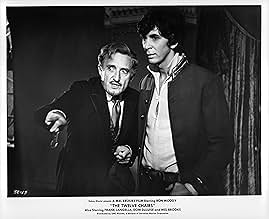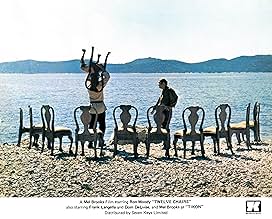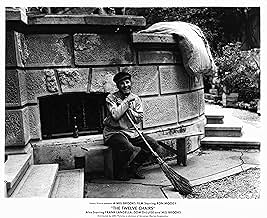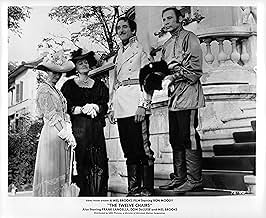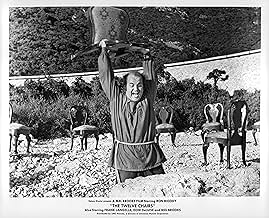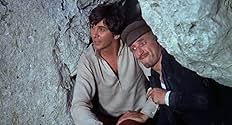IMDb RATING
6.4/10
7.5K
YOUR RATING
In 1920s Soviet Russia, a fallen aristocrat, a priest and a con artist search for a treasure of jewels hidden inside one of twelve dining chairs, lost during the revolution.In 1920s Soviet Russia, a fallen aristocrat, a priest and a con artist search for a treasure of jewels hidden inside one of twelve dining chairs, lost during the revolution.In 1920s Soviet Russia, a fallen aristocrat, a priest and a con artist search for a treasure of jewels hidden inside one of twelve dining chairs, lost during the revolution.
- Awards
- 1 win & 1 nomination total
Andréas Voutsinas
- Nikolai Sestrin
- (as Andreas Voutsinas)
Mladen 'Mladja' Veselinovic
- Peasant
- (as Mladja Veselinovic)
Petar Banicevic
- Sergeant
- (uncredited)
Dejan Cavic
- Orator
- (uncredited)
6.47.5K
1
2
3
4
5
6
7
8
9
10
Featured reviews
Expect the worst
"Hope for the best, expect the worst", as the title song goes, is exactly how I felt when I picked up my copy. Having read the original Russian novel and being a fan of Mel Brooks, I was curious how the two would come together. I was rather apprehensive, knowing how Russian literature usually suffers in translation, but hopeful that Brooks would somehow make something of it anyway. The film disappoints on both counts - there's precious little of the original in it, and Brooks isn't at his best here either. Moody is actually OK as Vorobyaninov, but the casting of Langella as Bender is just plain wrong, as he cannot possibly convey the depth and subtlety of the original character. Langella alone is enough to kill this film for anyone familiar with the book. None of the uproarious humor of the novel is anywhere to be found, while the few semi-funny visual gags are merely typical Brooks slapstick and have nothing to do with the source material. And even those aren't among Brooks' best. However, having expected the worst, I wasn't exactly disappointed. An OK little comedy, if you don't expect too much. If you want more, read the book.
Hilarious odyssey across Russia on search of the family jewels
As Mel Brooks films go, I rate it second only to Young Frankenstein. The action takes place in Russia 10 years after the Revolution. Ron Moody is marvelous as a low IQ and totally inept former nobleman, now hiding out as a clerk in a government office, who learns that the family jewels had been sewn into one of the 12 dining room chairs. He returns to his former residence, now an old folks home, and learns from former servant, now janitor, Mel Brooks that the chairs are gone, confiscated by the government. Con man Frank Langella threatens to turn Moody in if he does not allow him in on the quest. Of course, the chairs have been widely distributed. A major fly in the ointment is Dom Deluise, the village priest, who has also learned the secret. He relinquishes all for greed ("O, Thou who knowest all---you know.") and competes in the search. Not a perfect movie, but loaded with laughs. May be Dom's funniest role. I give it an 8 out of 10.
Much Better Than Expected
I rented this film because it was the only Mel Brooks movie I hadn't seen. I had enjoyed all of his other movies and thought,"Why not see 'em all?" I thought since I hadn't heard of it it would be stupid. And, Man, was I wrong. This movie could be described as hilarious. I loved it. And it's not exactly like all other Mel Brooks movies. If you like Mel Brooks I recommend this film to you. Dom DeLuise is hilarious in this. Now go watch it with your family.
" I've Begged All My Life! "
In his lifetime Mel Brooks has created many motion pictures which have established him as an artistic genius. "The Twelve Chairs" is another milestone for him. From the very beginning of this film, to its ending, there is a sense of serious, but humanistic brilliance. The era is the aftermath of the Russian Revolution and a dying woman wants to clear her conscience and reveal her greatest sin. As thousands of the nobility are fleeing for their lives, she decides to hide her family's fortune inside the lining of a set of handcrafted chairs. That secret is her dying revelation and is said unfortunately into more than one set of ears. This initiates a mad dash for the lost treasure. Seeking the cache of jewels are three intrepid, but greedy set of characters. The first is incredibly talented Ron Moody who adroitly and brilliantly plays the legitimate, greedy and opportunistic son, Ippolit Vorobyaninov. Once a Marshall of the nobility, he is now reduced to a minor banking clerk and opportunistic son-in-law. Frank Langella is superior as Ostap Bender, a handsome, street-wise, traveling Gypsy, who also wants in on the treasure hunt. Finally there is Dom DeLuise who plays Father Fyodor, an Orthodox but impoverished monk who believes, God will help him find the elusive chair first. What the trio soon discover is that the chair is one of Twelve which have been scattered across the vast twelve thousand miles of Russia. If Mel Brooks sought to create an amusing memorable movie, he succeeded. By the time one reaches the end of this film, we realize . . . . a Classic has been born. ****
Who would guess that it comes from Mel Brooks?
Knowing that Mel Brooks usually makes the silliest movies possible, it's a surprise that he directed the lightweight comedy "The Twelve Chairs". It portrays a former Czarist (Ron Moody, happy birthday!) and a young soldier (Frank Langella) looking for some jewels hidden in chairs in the Soviet Union in the 1920s. I will say that not much really happens throughout much of the movie, but it is a famous part of Russian literature. I haven't read the novel, but the movie is worth seeing, if only as a look at Brooks's early career. Also starring Dom DeLuise and Brooks in a small role.
Epilepsy...
Epilepsy...
Did you know
- TriviaMel Brooks had problems with Yugoslavian extras who didn't speak English. In one scene, extras playing museum guards were supposed to walk through a museum, ringing hand bells and shouting, "Closing time! Closing time!" Instead, the extras misunderstood and shouted, "Cloakie Bye! Cloakie Bye!" Brooks decided "Cloakie Bye" was funnier, so he left it in the movie.
- GoofsDuring the chase through the train yard, a modern era bus can be seen passing in the background.
- Quotes
Ostap Bender: [after yet another failure] Remember the famous Russian proverb: "The hungrier you get, the tastier the meal." On the other hand, the French have a proverb: merde!
- Crazy creditsIn the opening credits the title of the movie is showed in Russian first (even with a typographic error 'Dvenadzat' stchlyev'), then it changes into the english title. The same happened at the end of the credits with the words "The end" (Konez), first cames the Russian word, than the english translation.
- ConnectionsFeatured in Sneak Previews: Take 2: Who's Funnier: Mel Brooks or Woody Allen? (1980)
- SoundtracksHope for the Best, Expect the Worst
Music by Johannes Brahms ("Hungarian Dance No. 4 in F# minor") and lyrics by Mel Brooks
- How long is The Twelve Chairs?Powered by Alexa
Details
Box office
- Gross US & Canada
- $1,806,258
Contribute to this page
Suggest an edit or add missing content


